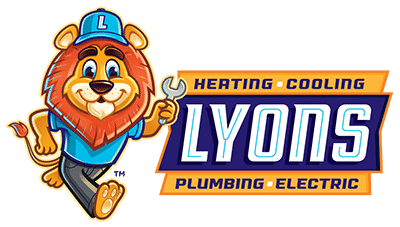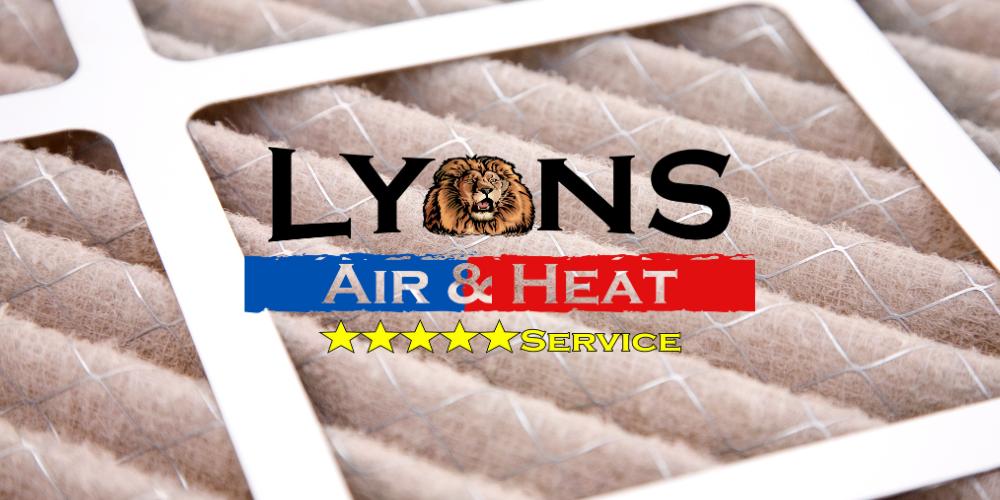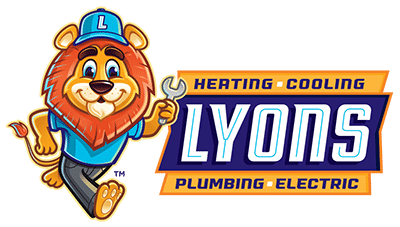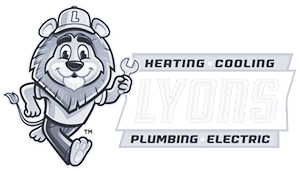Air filters play an important role in a home’s indoor air quality. Their job is to trap and remove harmful contaminants from the air you breathe. But how do you know just how effective your air filter is at removing contaminants? Well, that’s what a MERV rating is for. Developed by the American Society of Heating and Refrigerating and Air Conditioning Engineers (ASHRAE), a MERV measures the air filter’s ability to trap small particles in the air. Home and business owners can use MERV ratings to compare the performance of one air filter with another and determine which filter is right for their residential or commercial HVAC system.
In this post, our Rockwall air conditioning and heating technicians at Lyons Air & Heat will explain what a MERV rating is and what it means for your HVAC system.
What Does MERV Stand For?
MERV stands for Minimum Efficiency Reporting Value. The minimum efficiency reporting value is a measurement of a filter’s effectiveness when it comes to stopping dangerous airborne particles, such as household dust and pet dander, from passing through.
What is a MERV Rating?
MERV ratings are numbers ranging from 1 to 20 that specify the power of the air filter. Higher MERV ratings mean the air filter is more efficient at catching smaller particles. Of course, that means filters with lower MERV ratings are not as capable at trapping certain airborne particles.
What is a Good MERV Rating?
Just because a filter has a higher MERV rating does not mean that it is necessarily right for your home. There are several factors that must be considered when it comes to determining a “good” MERV rating for each individual home and business. For one, the needs of you and your family and/or employees must be taken into consideration. If there are people in the home or business who suffer from allergies, asthma, or other respiratory ailments, MERV filters with a higher rating might be necessary. Shedding pets may also necessitate an air filter with a higher MERV rating.
Another thing to consider is the power of your HVAC system. An air conditioning or furnace filter with a MERV rating on the higher end has more resistance, so it would take a powerful HVAC fan to successfully push air through that filter. This is because air filters with higher MERV ratings are typically created with more compact filtration material so as to catch the smallest particles. As such, if you put a filter with a MERV rating higher than what is recommended for your HVAC system, it will likely end up impairing the system’s performance and potentially leading to the need for frequent repairs or maintenance.
In order to avoid restricted airflow, it is important to check your HVAC system owner’s manual for the maximum MERV rating limit.
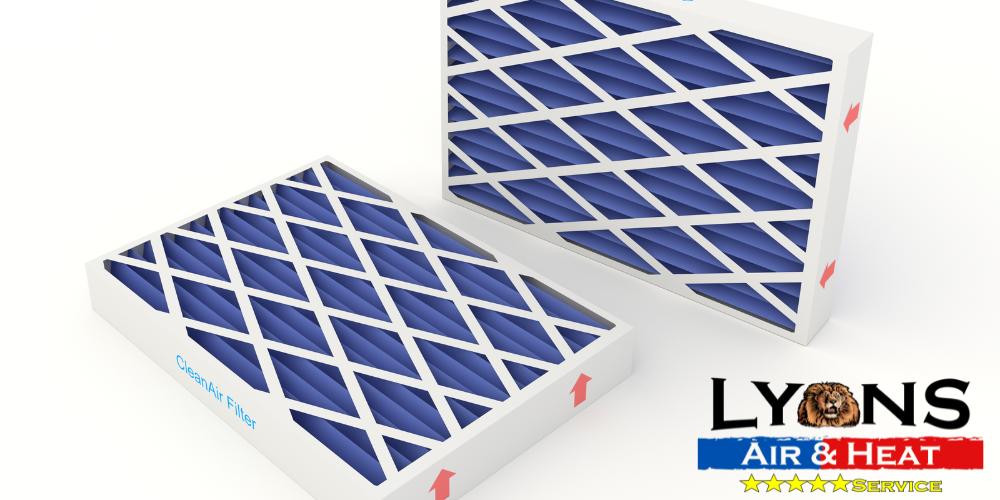
MERV Ratings
Once again, MERV ratings range from 1 to 20, with the highest MERV rating being the most powerful filter and the lowest rating being the least powerful. Below, we’ll breakdown each MERV rating range and just how many particles (as well as what kind of particles) it can catch.
MERV Rating 1-4
Air filters with a MERV rating between 1 to 4 are capable of catching only the largest airborne particles. This includes particles such as pollen, dust mites, carpet fibers, and sanding dust as small as 10 microns in size. Filters with a MERV rating of 1-4 are typically only used in residential furnaces and air conditioners.
MERV Rating 5-8
MERV filters with a rating between 5 and 8 are capable of catching contaminants with a particle size between 3 to 10 microns. This might include all of the previously mentioned particles as well as things like mold spores, cement dust, hair spray, pet dander, fabric protector, and dust lint. These AC and furnace filters may be used in commercial buildings as well as some households.
MERV Rating 9-12
Filters with a 9-12 MERV rating are capable of filtering particles down to 1 to 3 microns in size. This type of MERV filter traps all of the aforementioned contaminants in addition to things like coal dust, lead dust, auto emissions, welding fumes, and humidifier dust. These filters are rarely used in a home HVAC system, but rather are mostly found in commercial/industrial settings as well as in hospital laboratories.
MERV Rating 13-16
A filter with a MERV rating between 13 and 16 is considered to be heavy duty, as they are capable of filtering particulate matter as small as 0.3 to 1 micron in size. MERV 13-16 filters can trap each of the abovementioned particles as well as things like insecticide dust, copier toner, face powder, germs from sneezing, automobile fumes, and tobacco smoke particles. You will likely find these filters in places where heavy filtration is absolutely necessary, such as general surgery operating rooms and smoking lounges.
MERV Rating 17-20
Filters rated between 17 and 20 on the MERV scale are able to catch the smallest particles possible. In fact, they are capable of filtering down a particle size of less than 0.3 microns! High efficiency particulate air filters (aka HEPA filters) possess a MERV rating of 17 or higher. In addition to all of the particulates we’ve mentioned above, these filters are also able to trap carbon dust, sea salt, combustion smoke, virus carriers, and other microscopic allergens. These filters are almost never used in residential HVAC systems and are mostly reserved for clean rooms such as an orthopedic surgery room, pharmaceutical manufacturing facility, or where radioactive or carcinogenic materials can be found.
MERV Rating Chart
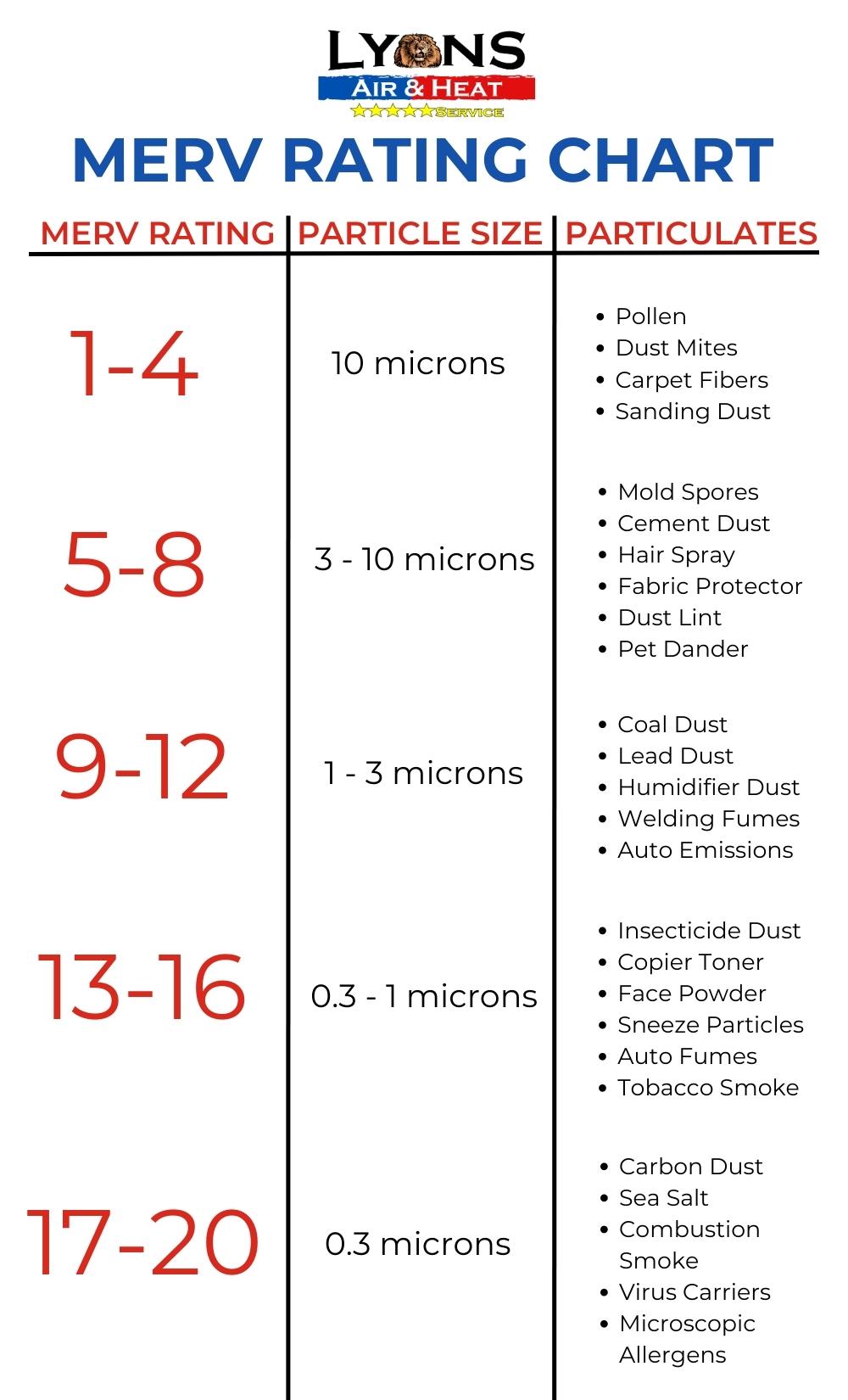
How To Find Your Filter’s MERV Rating
The air filter you buy should have the MERV rating labeled on it. When buying a new air filter, remember that the best MERV rating is not always the best option for your HVAC system. The higher the MERV rating, the more it will constrict the air flow on your HVAC unit. High MERV rating filters are intended for large, powerful HVAC systems that are capable of handling such a filter. Most often, a MERV filter with a rating between 5-8 is best for residential homes, but if you want to go higher, be sure to check your HVAC system’s manual for the maximum MERV limit. Exceeding this limit can result in reduced energy efficiency and may lead to the need for expensive repairs in the future.
Call Lyons Air & Heat Today for Superior HVAC Maintenance in the Rockwall Area
If you’re looking to improve the indoor air quality of your home or business, buying a good air filter is a great place to start. There are also other things you can do to improve your indoor air quality, such as purchasing an air scrubber or other air purification system. Whatever your Rockwall indoor air quality needs, a professional HVAC technician at Lyons AIr & Heat can help. To learn more about MERV filters or to schedule an appointment, give us a call at (214) 432-2859 today!
